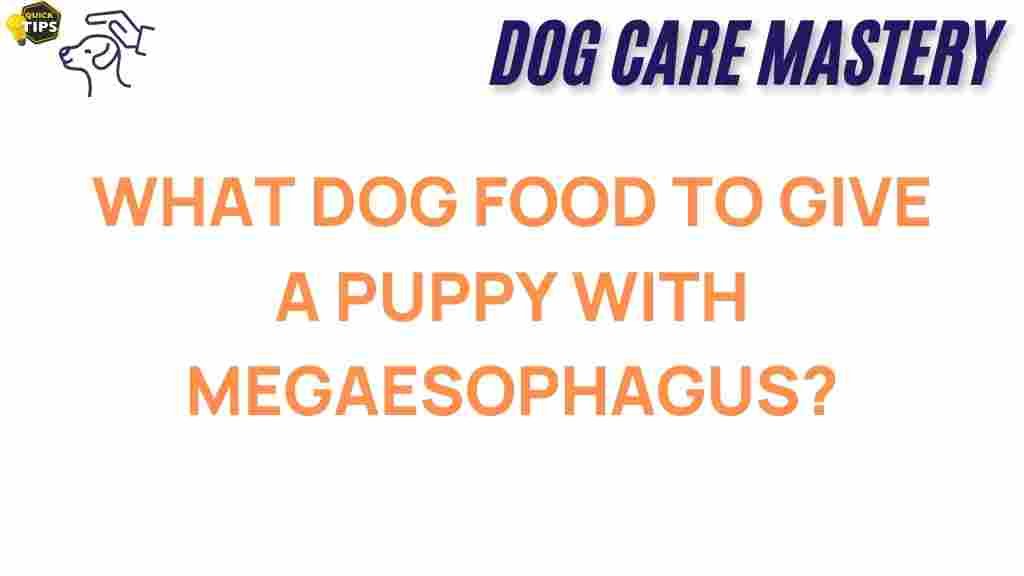When it comes to puppy nutrition, every pet owner wants to provide their furry friend with the best possible diet. However, for puppies diagnosed with megaesophagus, traditional feeding methods may not be effective. Megaesophagus is a condition that affects a dog’s ability to swallow food properly, leading to potential health risks. This comprehensive guide will help you understand how to navigate puppy nutrition for a dog with megaesophagus, ensuring they receive the nutrients they need while managing their condition effectively.
Understanding Megaesophagus
Megaesophagus is a condition characterized by an enlargement of the esophagus, which can lead to difficulty swallowing and the regurgitation of food. This condition can be congenital (present at birth) or acquired due to various factors such as neurological disorders, myasthenia gravis, or other health issues. Understanding the implications of this condition is crucial for making informed decisions about your puppy’s nutrition.
Signs and Symptoms
Recognizing the signs of megaesophagus is important for early intervention. Common symptoms include:
- Regurgitation of food or water shortly after eating
- Coughing or gagging during or after meals
- Weight loss or failure to gain weight
- Pneumonia or respiratory issues due to aspiration
If you notice any of these symptoms in your puppy, consult your veterinarian for a proper diagnosis and treatment plan.
Feeding Guidelines for Puppies with Megaesophagus
Feeding a puppy with megaesophagus requires special techniques to ensure that they can get the nutrition they need without complications. Here’s a step-by-step guide to help you navigate puppy nutrition for dogs with this condition:
1. Choose the Right Food
When selecting food for a puppy with megaesophagus, consider the following:
- Soft, Moist Food: Opt for high-quality canned food or moisten dry kibble with water or broth to create a softer texture.
- Highly Digestible: Choose food that is easy to digest and rich in essential nutrients, avoiding fillers and preservatives.
- High-Quality Protein: Select foods that contain real meat as the primary ingredient to support muscle growth and overall health.
2. Adjust Feeding Techniques
Feeding techniques are crucial for puppies with megaesophagus. Here are some effective methods:
- Upright Position: Always feed your puppy in an upright position. Consider using a specially designed feeding chair or hold them upright while they eat.
- Elevated Bowls: Use elevated food and water bowls to facilitate easier swallowing.
- Small, Frequent Meals: Instead of large meals, provide smaller portions several times a day to reduce the risk of regurgitation.
3. Monitor Water Intake
Hydration is key in puppy nutrition. Ensure your puppy has access to fresh water at all times, but consider offering water in smaller amounts to prevent overwhelming their esophagus.
4. Consider Thickening Agents
Some pet owners find that using thickening agents can help manage the consistency of food and water. Consult your veterinarian before introducing any new products, as they can recommend safe options.
Supplementing Puppy Nutrition
In addition to a well-balanced diet, puppies with megaesophagus may benefit from nutritional supplements. Here are some options to consider:
- Probiotics: These can aid digestion and promote gut health.
- Vitamins and Minerals: Ensure your puppy receives all essential vitamins and minerals, particularly if they are struggling to maintain weight.
- Omega-3 Fatty Acids: These can support overall health and may help with inflammation.
Always consult your veterinarian before adding supplements to your puppy’s diet to ensure they are appropriate for their specific needs.
Troubleshooting Common Feeding Issues
Even with careful planning, you may encounter challenges while feeding a puppy with megaesophagus. Here are some common issues and solutions:
1. Regurgitation After Meals
If your puppy continues to regurgitate after meals, consider the following:
- Ensure they are eating in an upright position.
- Reduce meal size and frequency.
- Consult your veterinarian for potential changes in diet or feeding techniques.
2. Weight Loss
Weight loss can be a serious concern for puppies with megaesophagus. If your puppy is losing weight, try:
- Increasing the caloric content of their food by choosing higher-fat options.
- Adding nutritional supplements to their diet.
- Monitoring their feeding process closely to ensure they are consuming enough food.
3. Aspiration Pneumonia
Aspiration pneumonia can occur if food or water is inhaled into the lungs. To minimize this risk:
- Feed in small amounts and allow adequate time for swallowing.
- Keep your puppy upright for at least 30 minutes after eating.
- Consult your veterinarian for further guidance on managing this risk.
Conclusion
Navigating puppy nutrition for a dog with megaesophagus can be challenging, but with the right approach, you can ensure your puppy receives the essential nutrients they need for a healthy life. By choosing the right food, employing effective feeding techniques, and monitoring your puppy’s health closely, you can help manage their condition effectively.
Always remember to consult your veterinarian for personalized advice tailored to your puppy’s specific needs. With the right support and care, your puppy can thrive even with megaesophagus.
For more information on puppy nutrition and care, visit this helpful resource.
For expert advice on pet health, check out this external link.
This article is in the category Nutrition and created by dogcaremastery Team
